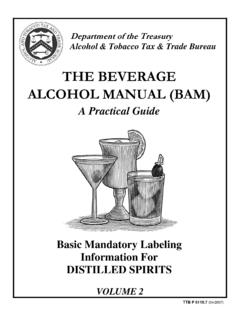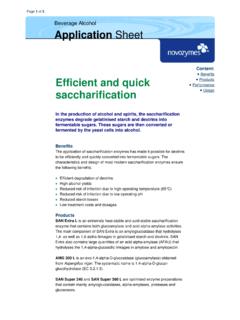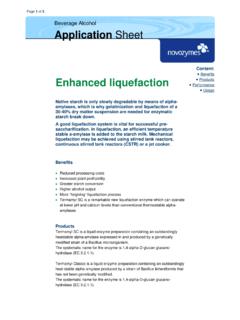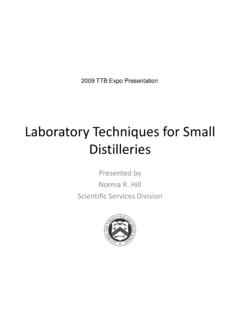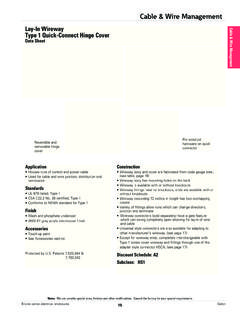Transcription of Enhancing alcohol production with enzymes - Mountain …
1 Enhancing alcohol production with enzymesEfficient alcohol production Let Novozymes' enzymes bring your alcohol production more savings and increased efficiency. enzymes allow you to benefit from the non-pressure cooking (NPC) process, which has maximum operating temperatures between 60 C and 95 C. The high temperatures (150 C) and high energy consump-tion associated with standard alcohol production are now a thing of the past. The NPC process cost-effectively breaks down and gelatinises the starch of grain, potatoes or other raw materials, preparing them for subsequent enzymatic breakdown into fermentable sugars. Look at all the benefits the NPC process gives savings Avoid heating the mash to high temperatures, saving you considerable energy and savingsAvoid installing expensive pressure-cooking vessels when renovating or constructing production increasePrevent the thermal breakdown of sugars and the subse-quent formation of unwanted Maillard products.
2 Quality improvementImprove the organoleptic properties of the distillates with the lower temperatures of the NPC process. The NPC grinding or milling the raw material slurrying the raw material in water adding a liquefying enzyme heating the slurry observing a holding period cooling adding saccharifying enzyme cooling adding yeast fermenting complete solution suite Novozymes has a complete suite of enzymes to facilitate all phases of the non-pressure cooking process! Termamyl SCThermo-stable bacterial alpha-amylaseDeclared activity: 120 KNU(S)/gTermamyl 120 LThermo-stable bacterial alpha-amylase Declared activity: 120 KNU/gBAN 240 L / 480 LBacterial alpha-amylaseDeclared activity:BAN 240 L: 240 KNU/g BAN 480 L: 480 KNU/gFungamyl 800 LFungal alpha-amylaseDeclared activity: 800 FAU/g SAN Super 240 L / 360 LAmyloglucosidase with a balancedcontent of acid alpha-amylase and proteinase Declared activity: SAN Super 240 L: 240 AGU/ml SAN Super 360 L: 360 AGU/mlSAN Extra LAmyloglucosidase with a balancedcontent of acid alpha-amylaseDeclared activity: 400 AGU/gNeutrase LNeutral bacterial proteinaseDeclared activity: AU/gAlcalase L Bacterial proteinaseDeclared activity: AU/gViscozyme LFungal mixed carbohydrase: beta-glucanase, cellulase, activity: 100 FBG/gShearzyme 500 LEndo-xylanaseDeclared activity: 500 FXU/gCelluclast L Cellulase Declared activity.
3 700 EGU/gDosageSome of the products are available in various strengths and the enzyme dosage needs to be adjusted stepProductTemperature ( C)pHCa++ (ppm)Dosage range (per t starch)LiquefactionTermamyl SCTermamyl 120 LBAN 240 LBAN 480 LFungamyl 800 g200-500 g200-500 g100-250 g100-150 gSaccharificationSAN Super 240 L SAN Super 360 LSAN Extra L50-6050-6030-705-65-63-6---1000-1200 ml600-800 ml500-700 gFermentation enhancementNeutrase LAlcalase L g20-50 gViscosity reduction, HGF(high gravity fermentation)Viscozyme LShearzyme 500 L45-6545-654-64-6--150-300 g20-50 gRaw materialMaize (corn), rice, sorghumWheat, barley, rye, oatsEquipment Mill, hammer mill with 1-2 mm sieve Mash tun with heating, cooling and stirring Saccharification tank with cooling equipment, fermentersMillMill grain WaterSlurry the milled grain into water at max. 50 C:300-350 l/100 kg grain pH/Ca++ Check the pH; if below , adjust to pH 6 using lime or Termamyl SCEnzyme Add:Termamyl 120 L 200-500 g/t starchor Termamyl SC 150-450 g/t starchAdd:Fungamyl 800 L 100-150 g/t starchor BAN 240 L 200-500 g/t starch or BAN 480 L 100-250 g/t starchAdd: Viscozyme L 100-200 g/t mash orShearzyme 500 L 50-100 g/t mashTemperatureHeat to 85-95 CHeat to 60-65 C HoldHold this temperature for 30-60 minutesCool Cool to 55 C Cool to 55 C using a cooling spiral,by adding cold water or a combina-tion of the two pHCheck the pH.
4 If above 6, adjust to with sulphuric acidEnzyme Add:SAN Super 240 L l/t starch, SAN Super 360 L l/t starch or SAN Extra L kg/t starchCoolCool to 30 C after holding for 30-120 minutesYeast Add:Inoculum yeast mash 8-10% or baker's yeast 1 kg/m3 mashCoolCool to setting temperatureFerment Transfer to fermenter and ferment for 48-72 hoursThe following table provides an overview of the non-pressure cooking process phases and how to apply Novozymes' enzymes for optimum results. We have also given some helpful tips (see to and the Useful tips section) to help you even you brew more materialPotatoes, manioc, cassava & other tubersProcessRecirculationSteam jetEquipment Hammer mill, 2 mm sieve Tank with recirculation pump, pipes and heating equipment Mash tun with stirring and cooling Saccharification tank with cooling equipment FermentersSteam jet Hammer mill, 2 mm sieve Pump Steam jet Mash tun with heating, cooling and stirring Saccharification tank with cooling equipment FermentersWater Fill hot water (85-95 C) into circulationtank, approx.
5 5-10% of batch amount of water and same high temperatureFill hot water (85-95 C) into mash tun, approx. 5-10% of batch volume. Same amount of wa-ter and same high temperatureStart mill and pumpStart recirculation pumpStart milling potatoes into tankStart milling potatoes Enzyme When 10% of potatoes are milled, add Termamyl SC 150-300 g/t starch to the tankStart dosing Termamyl SC 150-300 g/t starch into the millStart jetPump milled potatoes through steam jet into mash tun, heating them to 85-95 C. Start stir-rer in mash tun pH pH should be ; if necessary, adjust by adding lime solution to the mill: approx. kg lime/t potatoesTemperatureHold temperature at 85-95 C by steam injectionHoldContinue recirculation for 15-30 mi-nutes after milling is completed. Trans-fer batch to mash tunKeep batch in mash tun for 30-60 minutes af-ter filling is completed. The mash has to be mo-ved constantly with slow stirring using strong stirring equipmentCool Cool to 55 C using a cooling spiral, by adding cold water or a combination of the twopHCheck the pH; if above 6, adjust to with sulphuric acidEnzyme Add SAN Extra L l/t starch, SAN Super 240 L 1 l/t starch or SAN Super 360 L l/t starchCoolCool to 30 C after holding for 30-120 minutes at 55 CYeast Add:Inoculum yeast mash 8-10% or baker's yeast 1 kg/m3 mashCoolCool to setting temperatureFerment Transfer to fermenter and ferment for 48-72 hourspH >6 Termamyl SC80 C85 C90 C95 CTermamyl 120 L70 C75 C80 C85-95 CBAN60 C65 C70 C75 CFungamyl 60 C60-65 C60-65 C60-65 CUsefultipsThe processes described will work in the vast majority of cases.
6 The following tips may, however, help to optimise the process or solve any problems that may arise. (Letters to refer to pages 4 and 5) The stability and the performance of the liquefying en-zyme are influenced by pH temperature calcium closer to the optimum conditions given above, the lower the required enzyme dosage. Guidelines for the rela-tionship between pH and highest advisable temperature are as follows: with Termamyl 120 L or BAN, it is always advisable to make sure that the pH is within the range This can be achieved by adding lime. This will also add calcium, which stabilises the grain and when using hard water, both pH and calcium concentration will normally be adequate. If soft water (<5 dH, corresponding to 35 ppm Ca) is used, the addition of lime Ca(OH)2 is recommended. A starting dosage of kilograms per ton of raw material is suggested. It may then be adjusted according to experience.
7 For potatoes, the addition of lime is often necessary to adjust pH and calcium level ( kilograms per ton of raw material).When using new Termamyl SC, Ca adjustment is not needed and the optimum pH range is It is advisable to dilute the enzyme with cold water before addition, 1 litres of enzyme with 10 litres of water. A reduction in the fermentation time of 10-20 hours may be achieved by adding Fungamyl 800 L (50-100 g/t starch) together with SAN Super (not necessary when Fungamyl is used as the liquefaction enzyme) after cooling to 55 yeast dosage must be increased by at least 25% and the fermentation temperature increased by 2 C. (For bak-er's yeast, the maxium temperature is 35 C; for propagated yeast, the maximum temperature is 38 C). Another option is to use Alcalase L at 20-50 g/t starch. In 24 hour yeast propagations, add 10 ml SAN Super 240 L or 7 ml SAN Super 360 L to each 100 litres of yeast mash.
8 In the event of viscosity problems with mash and stillage, we recommend adding the broad carbohydrase Viscozyme L at 100-200 g/t mash or Shearzyme 500 L at 50-100 g/t mash during cooling at around 55 C. Ask for our latest product developments and recommendations. Alternatively, mill the grain with warm water (50 C) or cold water (20 C). The liquefying enzyme can then be added to the mill advantageously. A two-tank system might be advantageous. The slurry could be prepared in one tank while the previous batch is processed in the other tank. The capacity of the unit would thus be increased. Alternatively, prepare the slurry at 15 C the day before and keep it overnight without heating. At 60-65 C, Fungamyl is recommended, in which case pH is sufficient. If 70-75 C is considered necessary, BAN must be used. For viscosity reduction, we recommend using Viscozyme L or Shearzyme in combination with BAN, Fungamyl or Ter-mamyl.
9 Ask for our latest product developments and recom-mendations. The amount of water depends on the starch content of the potatoes. The lower the starch content, the less water is needed. Problems with deposits on heat surfaces can usually be solved by adding Neutrase L at 50-150 g/t starch or Al-calase L at 25-75 g/t starch. This will often also improve fermentation. The mill, pump and jet are started in close A/SKrogshoejvej 362880 BagsvaerdDenmarkTel. +45 8824 9999 Fax +45 8824 more information or for more office addresses,please , regulations and third party rights may prevent customers from importing, processing, applying and/or reselling certain products in a given manner. It is the responsibility of the customer that their specific use of products from Novozymes does not infringe relevant laws and regulations and, furthermore, does not infringe patents or other third party rights.
10 The contents of this document are subject to change without further sales offices:Africa, Sub-Sahara:Sandton, South AfricaTel. +27 11 444 8124 Australia & New Zealand:Sydney, AustraliaTel. +61 2 9630 8466 Central & Western Europe:Paris, FranceTel. +33 146140746 China:Beijing, ChinaTel. +86 10 6298 7888 Eastern Europe:Vienna, AustriaTel. +43 1505 4757 Indian Subcontinent:Bangalore, India Tel. +91 280 8418275 Japan: Tokyo, JapanTel. +81 432 966 767 Korea: Seoul, KoreaTel. +82 2 795-0882 Mexico, Central America & Caribbean: Mexico City, MexicoTel. +52 55 5394 8778 Middle East & Northern Africa:Athens, GreeceTel. +30 2 10 96 70 451 North America:Franklinton, North CarolinaTel. +1 919 494 3000 Russia & Belarus: Moscow, RussiaTel. +7 095 234 44 01 South America:Araucaria, Parana, BrazilTel. +55 41 641 1000 South-East Asia: Kuala Lumpur, MalaysiaTel. +60 3 8996 1588 Novozymes A/S Customer Communications No.
